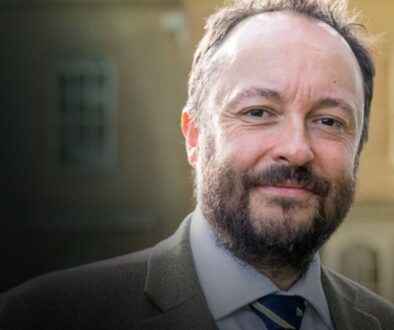Gospel Values and the Catholic School
by Raymond Friel
After the last serious outbreak of urban rioting in this country, back in 2011, the then prime minister David Cameron responded with a speech which identified a “slow-motion moral collapse” as the cause of the unrest. There followed much soul-searching as we tried to identify what we stood for as a nation and what was the best way to educate our young people so they would not grow up into people who wanted to destroy society.
 A set of “British values” were drawn up which all schools – independent, academies and maintained – were then required to promote. Fundamental British values, as they are known, are democracy, the rule of law, individual liberty, and mutual respect of those with different faiths and beliefs. In addition, the government started to look for character traits (or virtues) which might be promoted in schools.
A set of “British values” were drawn up which all schools – independent, academies and maintained – were then required to promote. Fundamental British values, as they are known, are democracy, the rule of law, individual liberty, and mutual respect of those with different faiths and beliefs. In addition, the government started to look for character traits (or virtues) which might be promoted in schools.
The education White Paper, Educational Excellence Everywhere, published in March 2016 this year, said that “a 21st-century education should prepare children for adult life by instilling the character traits and fundamental British values that will help them to succeed: being resilient and knowing how to persevere, how to bounce back if faced with failure, and how to collaborate with others at work and in their private lives.” On the face of it those values and traits seem reasonable enough, but a number of commentators have challenged them. What is so uniquely British about those values? Couldn’t they also be described as Belgian values or Dutch values? The character traits all seem to focus on performance, with very little moral depth. It would be quite possible, after all, to be resilient and collaborative without a moral bone in your body. One would assume that terrorists would have to be resilient and collaborative in order to carry out their hateful work.
For Catholic schools, the values and traits presented to us by government are incomplete. We will of course dutifully promote British values, but within another set of values which we stand for, namely Gospel values. There are some in Catholic education who would prefer a focus on virtue, since we have a rich theological understanding of virtue, especially the cardinal virtues of faith, hope and charity. This should also be part of the educational DNA of our schools. But in this period of national soul-searching, which has only intensified after the Brexit vote, I believe that the language of values allows us to join the national debate more effectively.
What, then, are Gospel values? Many Catholic schools in their mission statements refer to the importance of Gospel values without always spelling them out. Bishop Marcus Stock of Leeds, in his book Christ at the Centre, provides a list of Gospel values based on the Beatitudes of St Matthew as follows: faithfulness and integrity; dignity and compassion; humility and gentleness; truth and justice; forgiveness and mercy; purity and holiness; tolerance and peace; service and sacrifice. As an aside, I think there is an interesting piece of work to be done on drawing Gospel values from one of the other Gospels. I don’t think the final list would be very different from Bishop Stock’s. But if you take Luke’s beatitudes, for example, or indeed his entire Gospel, there is much sharper criticism of attachment to wealth and a greater emphasis on prayer and the “daily bread” of discipleship.
So how different are these values from the British values we have been asked to promote? There is some convergence, but our Gospel values are richer and, of course, have a foundation in the eternal, unlike the values of the state. Gospel values are in many ways more radical than British values. They are, in fact, counter-cultural in as much as they oppose society’s operative values of power, prestige and the importance of possessions. There are, besides, some laws of the land which run counter to the teaching of the Church.
The other duty which has been imposed on schools in recent years is that of preventing young people from being radicalised and drawn into terrorism. Our Gospel is not a litany of platitudes; it is radical, and in some sense we are radicalising our young people. We are calling them to a life of service of others, not personal advancement.
Our Gospel is counter-cultural, but it is not anti-social. In the first encyclical on Catholic education, Spectata Fides, written in 1885, Pope Leo XIII encouraged the bishops of England and Wales in their work to establish Catholic schools and told them that “it is by these schools that good citizens are brought up for the state; for there is no better citizen than the man who has believed and practised the Christian faith from his childhood”. So are we on a collision course with the state because of the counter-cultural, some would say radical values that we promote? Absolutely not. From the beginning of our thinking about education we have always said that the purpose of Catholic schools is to produce young people who will serve the common good.
One of the most recent documents from the Congregation for Catholic Education in Rome was called Educating to Intercultural Dialogue in Catholic Schools: Living in Harmony for a Civilisation of Love. Our task in Catholic schools is to promote relentlessly this civilisation of love – the greatest Gospel value – in the face of threats ranging from aggressive atheism to terrorist extremism. The Vatican document says that “Catholic schools are encouraged to promote a wisdom-based society, to go beyond knowledge and educate people to think, evaluating facts in the light of values. They educate people to take on responsibility and duties, and exercise active citizenship.” What we stand for does not threaten society, or damage our young people. Quite the reverse. What we believe in is life-affirming, in the deepest sense.
This article first appeared in The Catholic Herald on 9 September 2017. Raymond Friel’s latest book, Gospel Values for Catholic Schools was published in January 2017.



